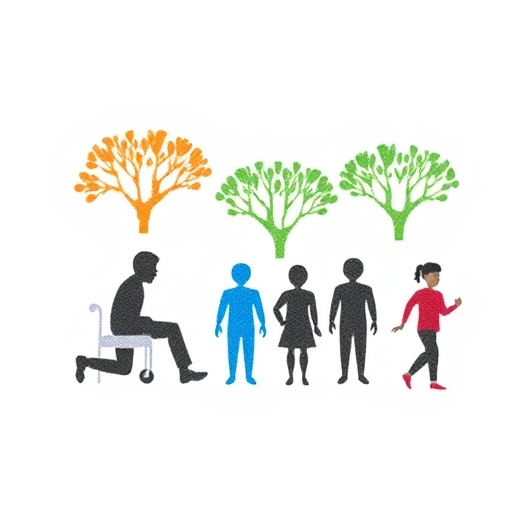
In recent years, the alarming rise in obesity rates has garnered attention worldwide, particularly among minority populations. One such group that has shown a concerning trend is South Asian Americans. Research has increasingly indicated a significant prevalence of obesity-related health issues within this community. In light of this, a groundbreaking study led by Khosla, Doshi, and Amin has ventured into the realm of faith-based interventions to tackle this pressing health crisis. The study, focusing on a faith-centered anti-obesity program, has provided fresh insights into how community-oriented initiatives can influence health outcomes, particularly in relation to Body Mass Index (BMI), diabetes, and hypertension.
Obesity is not merely about weight; it is a multifaceted issue that leads to various comorbidities. South Asian individuals, despite often being seen as fit and healthy, can have a higher risk of developing obesity-related health issues due to lifestyle factors and dietary patterns. The intricacies of these health risks often manifest differently than in other populations, highlighting the urgent need for targeted interventions. The new research promises a thoughtful exploration into these issues, aiming to bring effective solutions to the surface by engaging the community in meaningful ways.
The faith-based anti-obesity program targeted South Asian Americans, focused on the underlying cultural and religious elements that influence health behavior. Through this program, the researchers fostered an environment where participants could feel more connected and supported in their endeavors to lose weight and adopt healthier lifestyles. This aspect is crucial: when communities rally around a common cause, the potential for change exponentially increases. Using faith as a backbone for health initiatives allows for deeper engagement and commitment, leading to potentially lasting impact.
The study employed a prospective single-arm pre-post trial design, which is particularly effective for evaluating the changes in health metrics over time. This approach allowed the researchers to assess participants’ BMI, blood sugar levels, and blood pressure before and after the implementation of the program. The participants were actively involved in various activities ranging from dietary consultations to physical exercise, each session infused with cultural relevance to ensure higher retention and compliance. This strategy not only educated participants about healthy practices but also emphasized the importance of community and mutual support in achieving health goals.
One of the pivotal aspects of the study is its focus on cultural relevancy in health interventions. South Asian dietary customs and social structures play a critical role in shaping individuals’ health behaviors. Conventional obesity treatments often overlook these cultural nuances, which can lead to diminished effectiveness. By recognizing and incorporating culturally specific factors, the researchers could tailor the program to better suit the participants’ lifestyles, leading to remarkable improvements in their health outcomes.
The results of the trial were striking. Participants demonstrated significant reductions in BMI, with a notable percentage also reporting improved management of diabetes and hypertension. These findings underscore the potential of faith-oriented health initiatives as viable methods for combating obesity and related health conditions. The emphasis on spiritual engagement not only enriched the participants’ experiences but also reinforced their commitment to personal health improvement.
Community engagement proved crucial in the study’s execution, further highlighting a profound understanding of public health dynamics. Participants reported feeling more motivated and encouraged within a supportive group setting. This component was particularly essential in acknowledging that weight loss is not merely a physical endeavor but a journey that encompasses emotional and mental health aspects as well. With sustained support from their faith community, participants were more likely to stick to their health goals.
As obesity continues to challenge public health initiatives, this research opens doors for additional investigations into faith-based programs across diverse populations. The strong correlation between cultural identity and health behaviors suggests ample room for tailored interventions. These findings may set a precedent for future studies aimed at using community and faith-based frameworks to facilitate healthier lifestyle choices among various groups facing similar health challenges.
While this research focuses on South Asian Americans, its implications extend beyond this particular demographic. The integration of community-oriented, faith-based health initiatives presents a blueprint for addressing similar challenges in other minority populations. Although behaviors around food and exercise can be deeply entrenched and influenced by myriad factors, the success witnessed in this trial is clear evidence that a community-driven approach can yield meaningful change.
The impact of this study resonates on multiple levels: it contributes to the ever-evolving dialogue about obesity and chronic disease prevention, and it stimulates further academic inquiry into culture-centered health interventions. The methodology and findings of this trial could serve as a reference point for health policymakers, community leaders, and healthcare practitioners who aim to adapt existing frameworks to meet the needs of specific populations more effectively.
In conclusion, this faith-based anti-obesity program has played a pivotal role in addressing a critical health issue among South Asian Americans, showcasing the potential within community-driven approaches to foster substantial health improvements. The researchers have paved the way for additional studies that can continue to explore how faith and culturally nuanced strategies can influence health outcomes on a larger scale. Acknowledging and incorporating these elements into public health discussions can significantly enhance our understanding of obesity management and chronic disease prevention.
The implications of this research extend far beyond the immediate findings about BMI, diabetes, and hypertension. They underscore the power of community, culture, and faith in promoting health and wellness. A new horizon appears for future health interventions as we aim to bridge the gap between public health and personal responsibility through community empowerment.
Subject of Research: Faith-Based Anti-obesity Program Effects on BMI, Diabetes, and Hypertension in South Asian Americans
Article Title: Faith-Based Anti-obesity Program Effects on BMI, Diabetes, and Hypertension in South Asian Americans: A Prospective Single-Arm Pre-Post Trial
Article References:
Khosla, P., Doshi, R.H., Amin, K.S. et al. Faith-Based Anti-obesity Program Effects on BMI, Diabetes, and Hypertension in South Asian Americans: A Prospective Single-Arm Pre-Post Trial.
J GEN INTERN MED (2025). https://doi.org/10.1007/s11606-025-09767-1
Image Credits: AI Generated
DOI: 10.1007/s11606-025-09767-1
Keywords: Faith-based, obesity, South Asian Americans, health intervention, community support, BMI, diabetes, hypertension.
Tags: Body Mass Index reduction initiativescommunity engagement in healthcommunity-oriented health programscultural dietary patterns and healthdiabetes prevention in South Asianseffective solutions for health issuesfaith-based health interventionsfaith-centered wellness programshypertension management strategiesminority health disparitiesObesity-related comorbiditiesSouth Asian obesity crisis




